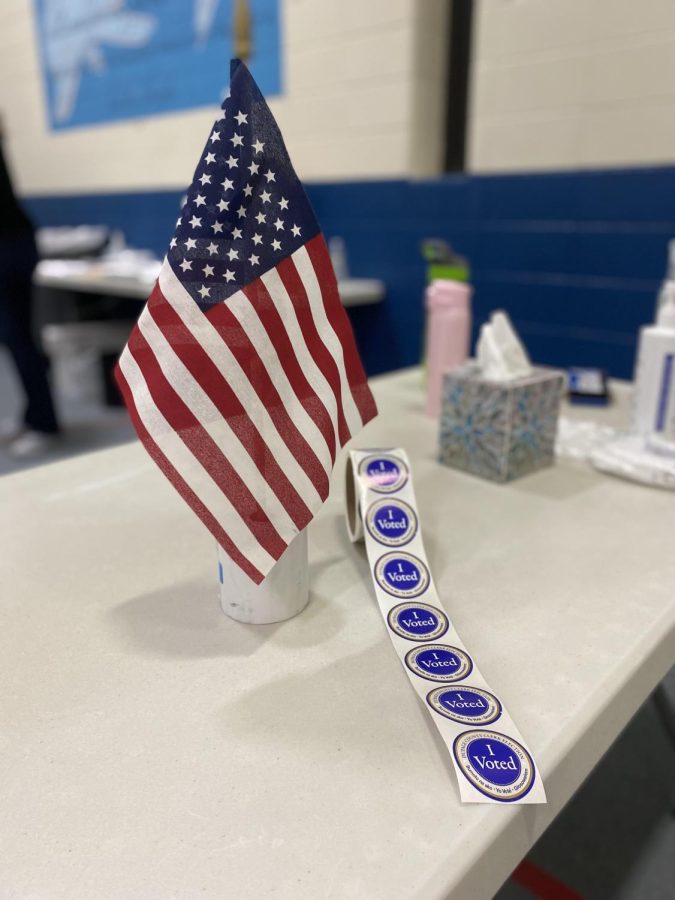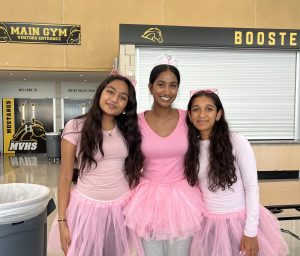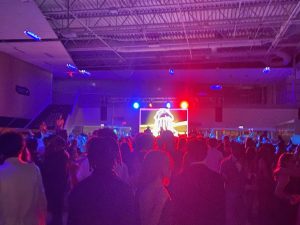Student election judge recounts experience at the polls
Students and adults from all across the community come together to monitor and judge elections.
November 10, 2022
While all my friends were sleeping during their mid-week vacation, I was shoveling cold eggs into my mouth at 4 a.m. Even so, I was late. As I entered the Nancy Young gymnasium, I saw my fellow election judges whom I had met the night before. Some were like me: high school students looking to help out or take a quick job over the break. Other judges were adults with children, grandchildren, and responsibilities outside of election judging. Regardless, all of us had arrived, cold and tired beyond belief, to set up the election equipment and get the ball rolling for when the doors opened to the polls.
Understandably, the first voters were slightly impatient and exhausted, just like us. For the first hour of our operations, there were some disagreements and confrontations between the election staff and the voters. While everything did end up getting sorted out in the end, it was not the greatest way to begin the 14-hour work day. Junior Pooja Nadiger was an election judge at Francis Granger Middle School on the day of the general election.
“Some people were fairly difficult,” Nadiger said. “One of the ladies abruptly refused to sign for her ballot because she did not want to use the Poll Pad [an iPad used for the express purpose of conducting elections]. Another voter was upset that we did not need their ID to give them the ballot.”
However, as the sun rose and people began to destress, the day started to go smoothly. Everyone alternated between jobs so that nothing got stale: one might work the scanner, printer, Poll Pad, and ballot box over the course of an hour. During downtime, we sat back and talked to each other, and in doing this we learned a lot about one another. Three of the people I worked with were former members of their school’s speech team, which immediately gave us something in common to talk about. Others had stories from previous election judging jobs to entertain us. Throughout the day, as we learned more and more about each other, I came to realize that the people maintaining the integrity of the election were just normal folks. They were the same type of people you bump into in the grocery store or see while filling up gas.
Along with this came other revelations. The structure of voting ensured that there was optimal security with the least amount of tedium possible. A notable amount of Americans have gradually lost faith in the election process, believing either that an outside force influences our democracy or that irreversible errors are manifested through incompetence. While these claims merit discussion, from what I saw as an election judge myself that day, there are very few methods by which our election can be influenced. For one: the judges are not powerful bureaucrats looking to manipulate the election under everyone’s noses: they are your friends and neighbors. There are also several bipartisan measures put in place so that no one party can take advantage. Both a democratic and republican judge must sign off on a signature before a ballot can be printed. Ballots that are “spoiled” – ruined through incorrect markings or damaged another way – are placed in special envelopes so that all ballots are accounted for, even those not used. In these ways and more, I have found the system to be airtight, at least for our local DuPage county elections.
“It was kind of funny how people reacted to the ease of the election,” Nadiger said. “Everything was secure, but because of how fast we were able to take people from the welcome table to the ballot box, many thought we were rushing and that we were not taking proper precautions.”
As the day went on, we continued to take votes and push through the fatigue. I saw old friends and family members voting, as well as general members of the community. I began to understand the election was not just about politics, it was about the people themselves as well. A voter and judge who had known each other for years spoke about recent personal familial developments while printing the ballot. A family friend of mine asked about my mother’s recent trip to India. Two voters recognized each other from across the room and immediately darted to each other, hugging and fumbling over their words as they tried to express their excitement for seeing one another. Parents voted alongside their newly-registered children. All through the day, there was a strong sense of community permeating the room, one that made the process that much better for everyone.
“It was an incredibly rewarding experience,” Nadiger said. “I will absolutely be judging again when I get the chance.”
As the day winded to a close and we took down all the election equipment, everyone said their goodbyes and started heading home. Fourteen hours and 732 votes later, the election was over. For me and many other student election judges, the experience is one that we enjoyed and one that we will be returning to the next chance we get – even if it means waking up at an ungodly hour again.








